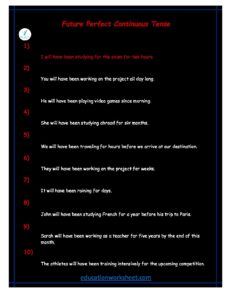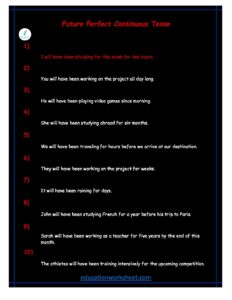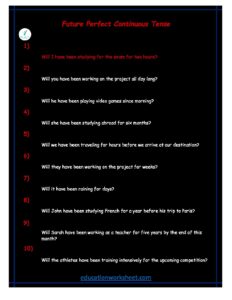how to converting Future Perfect Continuous Tense interrogative sentences to positive form
how to converting Future Perfect Continuous Tense interrogative sentences to positive form
The English language is a rich tapestry of tenses and sentence structures, each serving a unique purpose in conveying meaning and nuance. One of these tenses is the Future Perfect Continuous tense, a verb tense that describes actions or events that will have been ongoing at a specified point in the future. Interrogative sentences, or questions, in this tense ask about the duration and continuity of actions. To understand how to convert Future Perfect Continuous tense interrogative sentences to positive form, we must first grasp the basics of this tense and then explore the process step by step.
Understanding Future Perfect Continuous Tense

Before delving into the conversion process, let’s establish a solid understanding of the Future Perfect Continuous tense. This tense is used to describe actions or events that will have been ongoing for a period of time leading up to a future point in time. It is constructed using the formula:
Subject + will have been + present participle (base form of the verb + -ing)
For example, consider the sentence: “She will have been studying for three hours by 5 PM.” In this sentence, “will have been studying” is the Future Perfect Continuous tense, which indicates that the action of studying will continue until a future point in time (5 PM), and it will have been ongoing for three hours by that time.
The Conversion Process
Now that we have a firm grasp of the Future Perfect Continuous tense, let’s explore how to convert interrogative sentences in this tense to positive form. To convert a question to a positive statement, we need to remove the interrogative structure and make the statement more declarative in nature.
- Identify the Subject: Start by identifying the subject of the interrogative sentence. This is the entity performing the action or event in question. For example, in the sentence, “Will they have been working here for five years?” the subject is “they.”
- Identify the Helping Verb: In Future Perfect Continuous tense, the helping verb is “will have been.” This is used to indicate the future continuous nature of the action.
- Identify the Main Verb: The main verb in the Future Perfect Continuous tense is the base form of the verb plus -ing. In the example sentence, “working” is the main verb.
- Remove the Interrogative Structure: The key to converting an interrogative sentence to a positive form is to remove the interrogative structure (the question word and question mark). In our example, you would remove “Will” and replace it with the subject, “They.” So, “Will they have been working here for five years?” becomes “They have been working here for five years.”
- Rephrase for Clarity: Sometimes, it might be necessary to rephrase the statement slightly to ensure clarity. In the above example, it is already clear in the interrogative form, but in other cases, you might need to adjust the word order or add additional context.
- Add Punctuation: Finally, add the appropriate punctuation to your positive statement. In English, declarative statements end with a period (full stop).
Let’s practice this conversion process with a few examples:
Interrogative Sentence: “Will you have been traveling for a week?” Positive Form: “You will have been traveling for a week.”
Interrogative Sentence: “Will she have been singing all night?” Positive Form: “She will have been singing all night.”
Interrogative Sentence: “Will they have been working on this project for months?” Positive Form: “They will have been working on this project for months.”
As you can see, the conversion process is relatively straightforward. Once you identify the subject, helping verb, main verb, and remove the interrogative structure, you are left with a clear and concise positive statement in the Future Perfect Continuous tense.
Common Usage of Future Perfect Continuous Tense

The Future Perfect Continuous tense is not as commonly used as some other tenses in English, but it is essential for expressing actions that will have a significant duration leading up to a specific point in the future. Here are some common situations where this tense is applicable:
- Describing Duration: To specify the length of time an action will have been ongoing in the future. For example, “I will have been living in this city for five years by next month.”
- Expressing Effort: When you want to emphasize the effort or dedication involved in an action. For instance, “She will have been training for the marathon for six months by race day.”
- Predicting Continuation: When you predict that an ongoing action will continue until a certain future point. For example, “They will have been working on that report all night.”
- Hypothetical Scenarios: In hypothetical scenarios or conditional statements about future actions. For instance, “If he continues at this pace, he will have been learning the language for a year by the end of the program.”
how to converting Future Perfect Continuous Tense interrogative sentences to positive form


